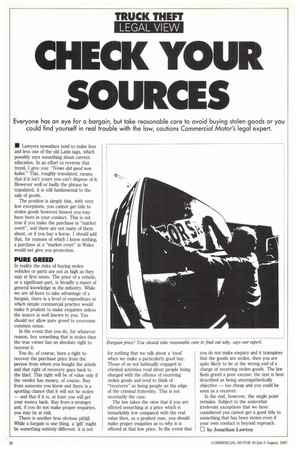CHECK YOUR SOURCES
Page 30

If you've noticed an error in this article please click here to report it so we can fix it.
Everyone has an eye for a bargain, but take reasonable care to avoid buying stolen goods or you could find yourself in real trouble with the law, cautions Commercial Motor's legal expert.
• Lawyers nowadays tend to make less and less use of the old Latin tags, which possibly says something about current education. In an effort to reverse that trend, I give you: "Nemo dat pod non habet." This, roughly translated, means that if it isn't yours you can't dispose of it. However well or badly the phrase be translated, it is still fundamental to the sale of goods.
The position is simply that, with very few exceptions, you cannot get title to stolen goods however honest you may have been in your conduct. This is not true if you make the purchase in "market overt", and there are not many of them about, or if you buy a horse. I should add that, for reasons of which I know nothing, a purchase at a "market overt" in Wales would not give you protection.
PURE GREED
In reality the risks of buying stolen vehicles or parts are not as high as they may at first seem. The price of a vehicle, or a significant part, is broadly a mater of general knowledge in the industry. While we are all keen to take advantage of a bargain, there is a level of expenditure at which simple commercial practice would make it prudent to make enquiries unless the source is well known to you. You should not allow pure greed to overcome common sense.
In the event that you do, for whatever reason, buy something that is stolen then the true owner has an absolute right to recover it.
You do, of course, have a right to recover the purchase price from the person from whom you bought the article and that right of recovery goes back to the thief. This right will be of value only if the vendor has money, of course. Buy from someone you know and there is a sporting chance that it will not be stolen — and that if it is, at least you will get your money back. Buy from a stranger and, if you do not make proper enquiries, you may be at risk.
There is another less obvious pitfall. While a bargain is one thing, a 'gift' might be something entirely different: it is not for nothing that we talk about a 'steal' when we make a particularly good buy. Those of us not habitually engaged in criminal activities read about people being charged with the offence of receiving stolen goods and tend to think of "receivers" as being people on the edge of the criminal fraternity. This is not necesarily the case.
The law takes the view that if you are offered something at a price which is remarkably low compared with the real value then, as a prudent man, you should make proper enquiries as to why it is offered at that low price. In the event that you do not make enquiry and it transpires that the goods are stolen, then you are quite likely to be at the wrong end of a charge of receiving stolen goods. The law finds greed a poor excuse: the test is best described as being unsympathetically objective — too cheap and you could be seen as a receiver.
In the end, however, the single point remains. Subject to the somewhat irrelevant exceptions that we have considered you cannot get a good title to something that has been stolen even if your own conduct is beyond reproach.
El by Jonathan Lawton




















































































































